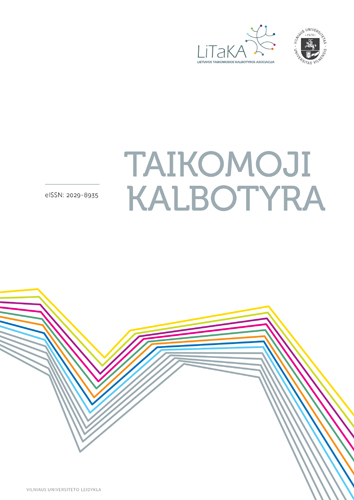Apie pažymimuosius pasakymus sakytinėje lietuvių kalboje
The use of attributive clauses in spoken Lithuanian
Author(s): Laura Kamandulytė-Merfeldienė, Ingrida BalčiūnienėSubject(s): Language acquisition
Published by: Vilniaus Universiteto Leidykla
Keywords: subordinate clause; attributive clause; utterance; spoken language; corpus; syntax;
Summary/Abstract: The syntactic features of spoken Lithuanian are still under-researched due to insufficient data bases, limited technologies, and research methodologies. During the last years, the Corpus of Spoken Lithuanian (developed at Vytautas Magnus University; 225,000 words; 80 hours of digitalized audio recordings) has been syntactically annotated, and this has enabled complex automatized syntactic analysis. In the present paper, one of the first such studies is presented and its results are discussed. The corpus linguistics methodology has been employed.The paper deals with the frequency and basic types of attributive clauses in spoken Lithuanian language. The results of the study have highlighted that attributive clauses tend to be more frequent (up to 15% of all subordinate clauses) in public speech, and they are significantly less frequent (up to 7% of all subordinate clauses) in private spontaneous speech.The position of a subordinate clause after the head noun is unmarked and the most frequent in public speech and spontaneous private speech. Consequently, 65% and 88% of all attributive adjectives followed the head noun in private spontaneous speech and in public speech. Since in Lithuanian the word order is not so strict, in private spontaneous speech constructions with a subordinate clause before the head noun are used.The analysis of subordinating conjunctions and relative pronouns has revealed that in public speech the link between a subordinate clause and an independent clause tends to be expressed by the relative pronoun kuris, kuri (‘which’). Namely, in public speech, this pronoun is employed in 85% of all attributive clauses. The number of relative pronouns in private spoken speech reaches only 30%, whereas the subordinating conjunction kur (‘where’) has been used in the majority of attributive clauses (51%). The findings of the study reveal the main tendencies in the distribution and frequency of attributive clauses and suggest that the usage of attributive clauses depends, to a large extent, on the register of spoken language
Journal: Taikomoji kalbotyra
- Issue Year: 2016
- Issue No: 8
- Page Range: 55-71
- Page Count: 17
- Language: Lithuanian

